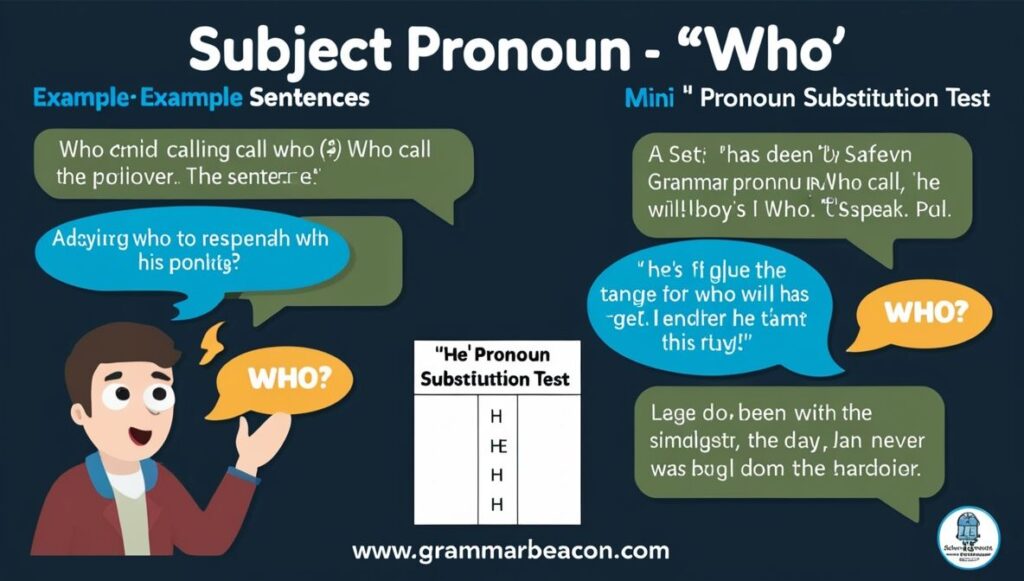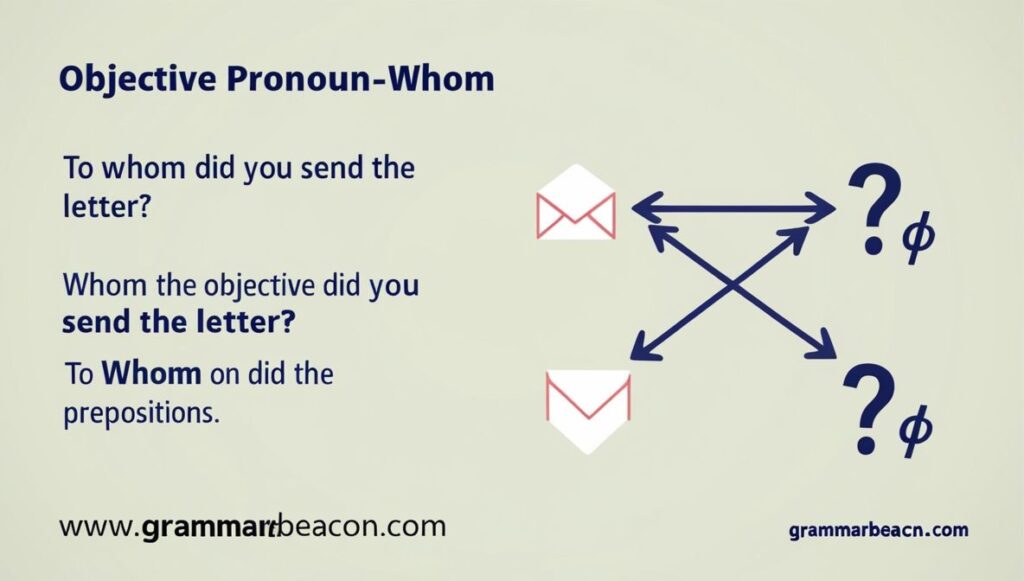Who vs. Whom is a common grammar challenge that trips up many writers and speakers alike. Understanding when to use who or whom hinges on grasping their roles as subjective pronouns and objective pronouns. This simple distinction helps clear up confusion around these often confusing pronouns and improves your proper grammar usage.
If you’ve ever paused wondering whether to say “Who is calling?” or “Whom did you call?” you’re not alone. By mastering the he vs him trick and recognizing the subject of a sentence versus the object of a sentence, you’ll gain confidence in your writing and speech. Let’s explore easy ways to spot the difference and use these pronouns correctly every time.
What’s the Real Difference Between Who and Whom?
Many people struggle with who and whom grammar because the two words look so similar but they function very differently.
- Who is a subjective pronoun – it does the action.
- Whom is an objective pronoun – it receives the action.
| Pronoun Case | Role in Sentence | Example |
|---|---|---|
| Who | Subject of a sentence | Who called you? |
| Whom | Object of a sentence | Whom did you call? |
A quick way to remember? Who = he | Whom = him This he vs him trick is your best friend in sorting them out.
When to Use “Who”

Think of “who” as the one doing something. It acts just like he, she, they, or any subject pronoun.
If you can replace the word with he or she, then “who” is the right choice.
Example Scenarios:
- Who is knocking at the door? (He is knocking.)
- I need to know who called this meeting. (She called this meeting.)
- She’s the one who always brings coffee. (He brings coffee.)
Tip to Remember:
If the word is doing something, it’s probably “who.” This is part of understanding subject vs object pronouns in English grammar who whom rules.
When to Use “Whom”

“Whom” plays the role of the receiver. It’s the person something is done to, often following a preposition.
If you can replace the word with him or her, then “whom” is correct.
Example Scenarios:
- Whom are you texting? (You’re texting him.)
- To whom should I address the letter? (To him.)
- She’s the professor whom I admire most. (I admire her.)
This is the correct use of whom, especially when following prepositions like to, for, or with.
A Foolproof Trick: He vs. Him = Who vs. Whom
This is the golden rule. If you’re ever stuck, rephrase the sentence using “he” or “him.”
| Test Sentence | Replace Pronoun | Use |
|---|---|---|
| ___ called the manager? | He called | Who |
| You gave the papers to ___? | Gave to him | Whom |
| ___ are they inviting to the party? | Inviting him | Whom |
| ___ is in charge of the event? | He is in charge | Who |
This easy grammar mnemonic device helps sort out even the most confusing pronouns.
Using “Whom” With Prepositions
If there’s a preposition involved, there’s a good chance you need “whom.”
Common Prepositions That Pair with Whom:
- To
- For
- With
- By
- About
Example:
- The client, for whom I designed the website, was thrilled.
This is a common structure in formal writing and often appears in professional editing services or academic work.
Why “Whom” Often Feels Awkward (and When to Let It Go)
Let’s be real—“whom” can sound overly formal or even outdated in casual speech. That’s why many native speakers skip it entirely.
Example:
- Correct: Whom are you meeting?
- Common in speech: Who are you meeting?
So what’s the deal?
Use “whom” when writing formally or when clarity matters. In emails, resumes, or essays, it adds polish. In casual texts? You won’t get grammar-shamed for using “who.”
Common Grammar Mistakes Involving Who and Whom
Knowing grammar rules for pronouns helps avoid classic errors. Here are a few red flags:
- ❌ Whom do you think you are? ✅ Should be: Who do you think you are?
- ❌ She’s the one whom won the award. ✅ Should be: She’s the one who won the award.
Top Grammar Tips: Who vs. Whom
- Use the he/him test every time you’re unsure.
- Pay attention to sentence structure ask who is doing what to whom.
- Formality matters: use “whom” in professional settings, but “who” is okay in most conversations.
- Look out for prepositions they’re strong clues that “whom” is correct.
Who vs Whom Examples in Real Life
| Real-Life Setting | Sentence | Which to Use |
|---|---|---|
| To whom it may concern | Whom | |
| Conversation | Who ate the last cookie? | Who |
| Job Interview Question | Whom have you worked with in the past? | Whom |
| Social Media Comment | Who else loves this movie? | Who |
These examples show how English usage often bends with context. But mastering the difference between who and whom adds clarity and confidence to your writing.
Mini Quiz: Who vs. Whom
Put your knowledge to the test with these quick questions. Choose the correct word.
| Sentence | Who or Whom? |
|---|---|
| ___ is responsible for this mess? | Who |
| To ___ did you give the documents? | Whom |
| ___ are they hiring for the new role? | Whom |
| ___ left their phone on the desk? | Who |
FAQs
Is it okay to use “who” instead of “whom” in casual speech?
Yes. Most native speakers do, especially in informal settings.
Why is “whom” disappearing from common usage?
Because it often feels stiff or overly formal in speech, many people skip it.
What’s the best tip for remembering the difference?
Use the he/him test if “him” fits, use “whom.”
Final Thoughts on Who vs. Whom
Understanding Who vs. Whom doesn’t have to be hard. Remember the basic rule: use who when talking about the subject, and whom when it’s the object. The he vs him trick makes it even easier. With a little practice, you’ll spot the difference quickly. Don’t worry if you slip up sometimes most people do. Just keep these tips in mind, and your writing will sound clear and confident. Mastering who vs. whom helps you use English more correctly and naturally every day.
Sources
- Merriam-Webster Dictionary – Who vs. Whom https://www.merriam-webster.com/words-at-play/who-vs-whom
- Grammarly Blog – When to Use Who vs. Whom https://www.grammarly.com/blog/who-vs-whom/
- Purdue Online Writing Lab (OWL) – Pronoun Case https://owl.purdue.edu/owl/general_writing/grammar/pronouns/pronoun_case.html
- The Chicago Manual of Style – Grammar FAQ https://www.chicagomanualofstyle.org/qanda/latest.html
- Cambridge Dictionary – Who or Whom? https://dictionary.cambridge.org/grammar/british-grammar/who-or-whom
- Oxford English Dictionary – Pronouns Usage https://www.oed.com/

James Logan is a seasoned blogger and language enthusiast behind Grammar Beacon. With years of experience in grammar and writing, James shares his expertise through insightful and engaging content. His passion for clear communication and linguistic precision shines in every post, making complex grammar concepts accessible and enjoyable for readers. Follow James for expert advice and tips to refine your writing skills.







